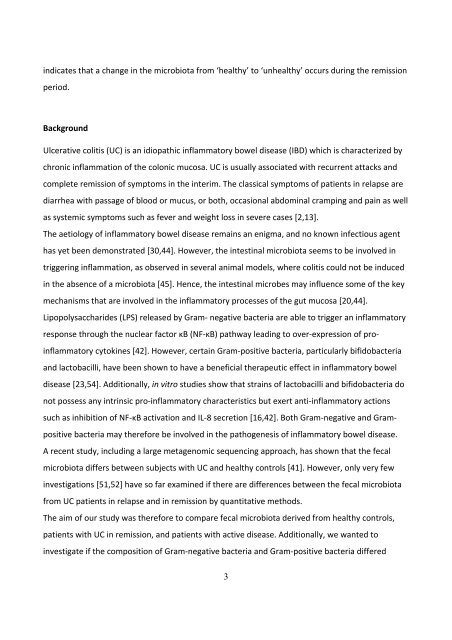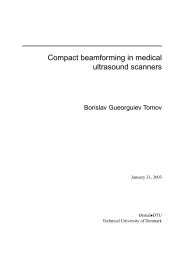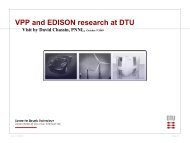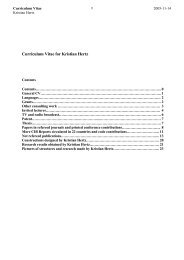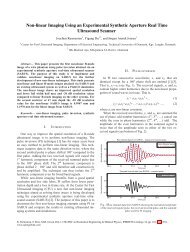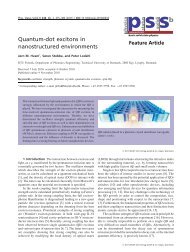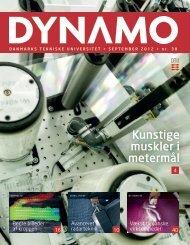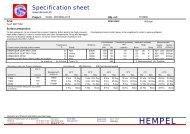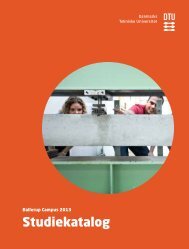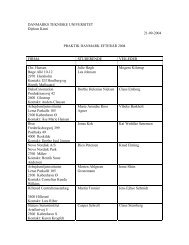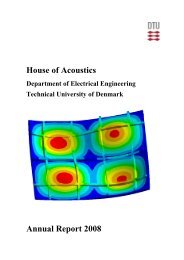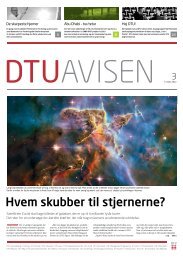Role of Intestinal Microbiota in Ulcerative Colitis
Role of Intestinal Microbiota in Ulcerative Colitis
Role of Intestinal Microbiota in Ulcerative Colitis
Create successful ePaper yourself
Turn your PDF publications into a flip-book with our unique Google optimized e-Paper software.
<strong>in</strong>dicates that a change <strong>in</strong> the microbiota from ‘healthy’ to ‘unhealthy’ occurs dur<strong>in</strong>g the remission<br />
period.<br />
Background<br />
<strong>Ulcerative</strong> colitis (UC) is an idiopathic <strong>in</strong>flammatory bowel disease (IBD) which is characterized by<br />
chronic <strong>in</strong>flammation <strong>of</strong> the colonic mucosa. UC is usually associated with recurrent attacks and<br />
complete remission <strong>of</strong> symptoms <strong>in</strong> the <strong>in</strong>terim. The classical symptoms <strong>of</strong> patients <strong>in</strong> relapse are<br />
diarrhea with passage <strong>of</strong> blood or mucus, or both, occasional abdom<strong>in</strong>al cramp<strong>in</strong>g and pa<strong>in</strong> as well<br />
as systemic symptoms such as fever and weight loss <strong>in</strong> severe cases [2,13].<br />
The aetiology <strong>of</strong> <strong>in</strong>flammatory bowel disease rema<strong>in</strong>s an enigma, and no known <strong>in</strong>fectious agent<br />
has yet been demonstrated [30,44]. However, the <strong>in</strong>test<strong>in</strong>al microbiota seems to be <strong>in</strong>volved <strong>in</strong><br />
trigger<strong>in</strong>g <strong>in</strong>flammation, as observed <strong>in</strong> several animal models, where colitis could not be <strong>in</strong>duced<br />
<strong>in</strong> the absence <strong>of</strong> a microbiota [45]. Hence, the <strong>in</strong>test<strong>in</strong>al microbes may <strong>in</strong>fluence some <strong>of</strong> the key<br />
mechanisms that are <strong>in</strong>volved <strong>in</strong> the <strong>in</strong>flammatory processes <strong>of</strong> the gut mucosa [20,44].<br />
Lipopolysaccharides (LPS) released by Gram‐ negative bacteria are able to trigger an <strong>in</strong>flammatory<br />
response through the nuclear factor κB (NF‐κB) pathway lead<strong>in</strong>g to over‐expression <strong>of</strong> pro‐<br />
<strong>in</strong>flammatory cytok<strong>in</strong>es [42]. However, certa<strong>in</strong> Gram‐positive bacteria, particularly bifidobacteria<br />
and lactobacilli, have been shown to have a beneficial therapeutic effect <strong>in</strong> <strong>in</strong>flammatory bowel<br />
disease [23,54]. Additionally, <strong>in</strong> vitro studies show that stra<strong>in</strong>s <strong>of</strong> lactobacilli and bifidobacteria do<br />
not possess any <strong>in</strong>tr<strong>in</strong>sic pro‐<strong>in</strong>flammatory characteristics but exert anti‐<strong>in</strong>flammatory actions<br />
such as <strong>in</strong>hibition <strong>of</strong> NF‐κB activation and IL‐8 secretion [16,42]. Both Gram‐negative and Gram‐<br />
positive bacteria may therefore be <strong>in</strong>volved <strong>in</strong> the pathogenesis <strong>of</strong> <strong>in</strong>flammatory bowel disease.<br />
A recent study, <strong>in</strong>clud<strong>in</strong>g a large metagenomic sequenc<strong>in</strong>g approach, has shown that the fecal<br />
microbiota differs between subjects with UC and healthy controls [41]. However, only very few<br />
<strong>in</strong>vestigations [51,52] have so far exam<strong>in</strong>ed if there are differences between the fecal microbiota<br />
from UC patients <strong>in</strong> relapse and <strong>in</strong> remission by quantitative methods.<br />
The aim <strong>of</strong> our study was therefore to compare fecal microbiota derived from healthy controls,<br />
patients with UC <strong>in</strong> remission, and patients with active disease. Additionally, we wanted to<br />
<strong>in</strong>vestigate if the composition <strong>of</strong> Gram‐negative bacteria and Gram‐positive bacteria differed<br />
3


